












Telecel is an Africa-focused telecommunication company, with a brand founded in 1986, operating primarily in Africa and converging telecommunication with ntech, e-commerce,
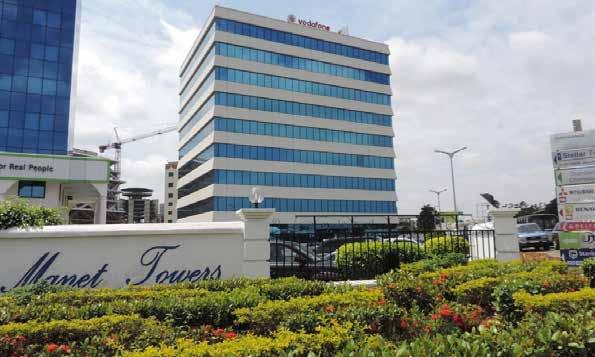

The completion of the agreement to acquire Vodafone Ghana by Telecel Group presents an opportunity for further innovation and continued delivery of unparalleled services to
as a vital market with unlimited potential for digitalization and innovation in Africa.
is the most recent major change for the Ghanaian telecommunications company since 2008 when Vodafone Group Plc purchased a controlling interest in GTCL and established
Operations of Vodafone Ghana and its three subsidiaries; National Communication Backbone Company Limited (Vodafone Wholesale), Vodafone Ghana Mobile Financial Services Limited (Vodafone Cash), and the Vodafone Ghana Foundation, will continue operations uninterrupted while embracing exciting new possibilities.
‘This acquisition is a testament to our enthusiasm and positive outlook for the Ghanaian market, which we view
Telecel Group is eager to develop and bring forward-thinking o erings to our subscribers, enterprises, and communities in Ghana. We look forward to a transformation journey of Vodafone Ghana with the contribution and growth of its human capital,’ stated Malek Atrissi, Telecel Group’s COO. Vodafone Ghana assures its customers and stakeholders of their unwavering commitment to continuity across all services and products.
Vodafone Ghana’s CEO, Patricia Obo-Nai said: ‘We are fully committed to delivering excellence across all facets of the business and providing our customers with innovative products and services. We embrace this change as an opportunity for us to explore new and exciting areas of growth.”
Hazel, a Zimbabwean, has interviewed celebrities such as Mel Gibson, Charlie Sheen, Jason Alexander, and musician Jewel Kilcher as a celebrity interview-
She is also a global speaker who has shared the stage with some of the world's most renowned business leaders, including George Ross, the former advisor to Donald Trump, Apple co-founder Steve Wozniak, Africa's rst billionaire Patrice Motsepe, Hollywood actor Mark Wahlberg, Michael Douglas, Brooke Shields, and John Travolta.

the prestigious Chairman's Award in recognition of her exceptional contributions to the world of business and leadership.
Hazel is a board advisor for the GCBL and the founder of Herrington Publications Worldwide, where she has worked tirelessly to help women build powerful personal and corporate brands.
In addition to her impressive accomplishments in the business world, Hazel is also the Australia Global Goodwill Ambassador with the Global Goodwill Ambassadors Foundation, a role that allows her to inspire and empower others to make a positive impact in their communities.
Hazel has also received multiple awards for her outstanding contributions to the business community, and she was recently awarded an Honorary Doctorate in Humanities in recognition of her dedication to empowering women and youth around the world.
Hazel's passion for making a di erence in the community is evident in her work with prison ministries and feeding programs for the less fortunate.
She nds great ful lment in giving back to those in need and has been instrumental in making a positive impact on the lives of countless individuals.
In her spare time, Hazel enjoys the African wildlife, walking with lions, and embracing elephants in Zimbabwe. Her love for the natural world and dedication to empowering others is an inspiration to us all.
Commenting on the award, Hazel pointed out that she was "deeply committed to supporting and empowering all individuals, including women, youth and men leaders around the world."
She expressed the belief that "by

working together, we can create a more inclusive and equitable business environment that recognizes and values the contributions of all individuals, regardless of their background or circumstance."
She wrote on her o cial LinkedIn handle: "As we look to the future, I am excited to continue working with the Global Chamber of Business Leaders to promote economic growth and development around the world. With a focus on innovation, collaboration and excellence, I am con dent that we can create a brighter, more prosperous future for all."
The Chairman's Award is the highest honour that can be bestowed upon an individual by the GCBL, and Hazel's accomplishments and contributions to the world of business and leadership are truly exceptional.
The GCBL is proud to have Hazel as a board advisor and looks forward to her continued contributions to the organisation and the business community at large.
About the Global Chamber of Business Leaders:
The Global Chamber of Business Leaders is a leading international organisation that is dedicated to promoting business excellence and the advancement of its members. With a global network of business leaders, the GCBL o ers a range of services and resources that are designed to help its members succeed in the world of business.

Research Foundation noted the country pushed its original deadline of 2020 to June 2023 due to administrative backlogs.
While emerging technologies like AI, cloud computing and IoT have enjoyed the spotlight in smart city discourse, Barker and Dignan explained data digitalisation sits at the centre of smart city planning across developing nations, helping governments reduce costs and make better decisions.
Open data as a rst step
cloud to enhance data processing: a move that helped redress issues around lost or outdated information due to unreliable power.
CNN reported the tie-up also covers the deployments of “dash cams” and “camera systems” as part of its cloud-based data integration to improve national security.
“I think increasing the e ciency of government administration through technology is where I can see a real opportunity”, said Barker.
tives have progressed in developed economies, with authorities in Europe and the Nordics taking a lead in employing digital technologies to improve municipal services.
But the concept of the smart city encompasses more than the application of digital tech in urban spaces. Ultimately, private sectors and authorities need to ensure technology makes a meaningful contribution across many aspects of a citizen’s life, the World Economic Forum (WEF) has argued in a report.
To achieve this, municipal authorities have begun deploying networks of cameras and IoT sensors to bolster public services in areas such as transportation and waste management.
Despite the objectives, WEF argues the adoptions and outcomes of smart city initiatives present a huge gap as technology companies favour investing in cities with mature economies across the United States (US) and Europe over the southern hemisphere.
In November 2022, WEF noted London, New York, Tokyo and Paris were among the top 10 smart cities based on nine metrics spanning from governance and digital skills to environmental sustainability. Developing cities, including Nairobi, Lagos, Brasilia and Kolkata, were at the bottom.
WEF further asserted smart city concepts are often criticised in the developing world, as local authorities are “frequently saddled with expensive systems” by foreign vendors, adding the projects are often “ill-suited to local realities”.
One potential reason for this is a misunderstanding of what a smart city actually is.
The Research Manager for government insights at IDC Europe, Louisa Barker, told Mobile World Live (MWL) “too often there is a shiny aesthetics of what a smart city should be”, citing visions of
vehicles as an example.
In reality, Barker said the de nition of a smart city should involve “working with the core challenges faced by citizens and putting technology second”.
Associate VP and Head of IDC government insights Europe, Joe Dignan, concurred while noting conversations around smart cities are clouded by “the futuristic parts”, leading to a lack of clarity about what a city really needs from smart initiatives.
Beyond the overall de nition of smart cities, developing nations also face more basic challenges including supply of power or water shortages, which may hinder the appetite for potentially costly technology deployments.
Core city challenges
A case in point would be Zimbabwe, where President Emmerson Mnangagwa announced plans to build a controversial yet ambitious smart urban landscape in 2022.
During the project’s opening ceremony, Mnangagwa explained that the $500 million plan would bring about “the smartest city in the region”, replicating Dubai’s commercial, high-tech concept in the northwest of Harare. However, Bloomberg reported the move triggered a split in opinions, particularly as the country remains plagued by electricity outages and many cities have had no reliable running water for years due to a legacy of racially divided urban systems.
The New Harare, backed by Emirati investors, will aunt a new stock exchange, presidential palace and luxury villas, but there is no word on whether the country’s more prevalent issues will be solved. Meanwhile, The Guardian reported a $90 billion plan unveiled by India in 2015 to build 100 smart cities was also met with backlash over fears of furthering economic inequalities.
An India-based think tank Observer
International Development Research Centre (IDRC), a research body headquartered in Canada, identi ed open data portals as a key enabler of smart city developments in Africa, Asia and South America, adding that the technology remained an isolated topic in the broader smart city narrative. The organisation described open data portals as a state-based initiative where a range of insights and datasets about a city’s urban development are made accessible to the public: supporting the evolution of smart technologies at a regional level and encouraging new digital services to become more citizen-centric.
Similarly, Financial Times argued transparency and better handling of municipal data are the lifeblood of new technologies.
With approaches like an accessible data portal or data crowdsourcing, developers can make digital tools tailored to address a city’s speci c needs. In Burkina Faso, a partnership between a local electricity company and NGO Open Burkina has helped residents of its capital. Ouagadougou, to become more resilient to power outages using “sensors installed in homes to collect data on power grid performance”. The datasets are later distributed to the a ected citizens and fed to the country’s national data portal.
Durban in South Africa is also an early adopter of an open data system. In 2011, the city established an open-source online repository to progress its smart city project, the Durban Edge.
Using deep data analysis, Durban Edge has published various metrics covering energy use, migration rates, nancial inclusion, waste management and housing. In turn, municipalities can bene t from the datasets to optimise public services.
In 2021, Durban struck a long-term smart city initiative with Microsoft, which includes the upgrade of its national IT infrastructure with Azure
5G unleashed

Dominique Bonte, MD and VP at ABI Research, stated 5G networks “will be very good for developing regions”, explaining real-time data rates and reliability are central to IoT in smart cities. “Tra c sensors, surveillance and smart streetlights are good examples that can e ciently prevent crime and manage crowd control”, he added, naming New Delhi and Bhopal as sound use cases of smart poles and energy-e cient streetlights.
This also holds true for Dignan, who branded 5G “an important part of disruptive technologies that are really coming through” and enabling developing nations to “leapfrog” developed smart cities.
While the uptake of 5G in the Asia Paci c so far is strong, uneven adoption due to a lack of digital skills persists outside of Japan, South Korea, Australia and Singapore, data from mobile industry association the GSMA showed.
What’s next?
It’s convenient to imagine a world where smart tech intervention can solve every urban challenge. As cities have their own priorities and issues, technology deployments cannot be approached in a universal way and should t a more localised context.
Public-private partnerships on smart initiatives might have pervaded developing markets in recent years, with WEF highlighting the potential of Asian and African regions in smart urban developments as the two continents are progressively employing digital tools to tackle problems that come with rural-urban migrations.
However, authorities should look more closely at ensuring the projects can serve the cities on a long-term basis. At the end of the day a smart city strategy “needs to be centred on addressing the challenges caused by the legacy infrastructure,” said Barker.
“If we ignore that, it’s not going to be e ective”.
Ing Asumeng Saw commended the government for its e orts to reclaim lands damaged by illegal miners.
“The government of Ghana has done a very good work. It has invested hugely to ensure that this damaged lands by Galamseyers are reclaimed and put to more productive use,” he expressed.
He, therefore, appealed to the chiefs in the Western North to support the government in ensuring that illegal miners do not return to these reclaimed
While pointing out some challenges militating against the project, the Site Manager of Dredge Masters, Gilbert Atima, asked that the various communities within the reclaimed lands be involved in the tree-planting phase of the

newly established National Alternative Employment and Livelihood programme ( NAELP) has reclaimed over 1000 hectares of land from illegal miners in the Western North.
Dr Carol Louise Donkor, National Coordinator of the Programme visited some of the areas being taken care of by Dredge Masters, a subsidiary of the Jospong Group of Companies (JGC). The company has successfully reclaimed 450 hectares of land from illegal miners (popularly known as Galamseyer) in the Western North.
Dr Donkor reiterated that The NAELP is aimed at alleviating the hardships of people adversely a ected by the activi-
the government’s e orts to sanitise the mining space.
The programme also includes a community mining scheme which presents a module for small scale mining in the country.
She said the project will create jobs for over two thousand youths in the a ected area through the replantation of the lands.
It was against this backdrop that Dredge Masters was contracted by the government in 2021 to help reclaim 414 hectares of galamsey lands in Asawinso A & B, Sefwi, Mepasem and Antobia all in the Western North Region.
Manager for Dredge Masters, Ing.
Bernard Asumeng Adjei Saw, said the project was 90% complete.
He disclosed that the company was awarded a contract to reclaim 414 hectares of illegal mining lands.
“But as it stands now, we have even exceeded the total hectares that we needed to reclaim. We have now done about 450 hectares of in total.
According to him, the land reclamation was part of other components of the project, stating that after that, his company will be moving to phase two of the project which is replanting trees on the reclaimed lands.
For his part, a Technical O cer for NALEP, Daniel Fordjour Agyemang, indicated that his out t has a plan in place which will see the involvement of all stakeholders to ensure the sustainability of the economic tress that will be planted on the lands.
“In no time we will roll all this out for the community to bene t,” he assured.
The Chairman of the Small Scale Miners in Juaboso, King George, said the programme has been bene cial to miners in the region.
Some of the workers undertaking the replantation also share their thoughts on how bene cial the project has been to them.
To date, the majority of smart city initiatives have progressed in developed economies, with authorities in Europe and the Nordics taking a lead in employing digital technologies to improve municipal services.
But the concept of the smart city encompasses more than the application of digital tech in urban spaces. Ultimately, private sectors and authorities need to ensure technology makes a meaningful contribution across many aspects of a citizen’s life, the World Economic Forum (WEF) has argued in a report.
To achieve this, municipal authorities have begun deploying networks of cameras and IoT sensors to bolster public services in areas such as transportation
and waste management.
Despite the objectives, WEF argues the adoptions and outcomes of smart city initiatives present a huge gap as technology companies favour investing in cities with mature economies across the United States (US) and Europe over the southern hemisphere.
In November 2022, WEF noted London, New York, Tokyo and Paris were among the top 10 smart cities based on nine metrics spanning from governance and digital skills to environmental sustainability. Developing cities, including Nairobi, Lagos, Brasilia and Kolkata, were at the bottom.
WEF further asserted smart city concepts are often criticised in the developing world, as local authorities are “frequently saddled with expensive systems” by foreign vendors, adding the projects are often “ill-suited to local realities”. One potential reason for this is a misunderstanding of what a smart city actually is.
The Research Manager for government insights at IDC Europe, Louisa Barker, told Mobile World Live (MWL) “too often there is a shiny aesthetics of what a smart city should be”, citing visions of modern buildings and unmanned vehicles as an example.
In reality, Barker said the de nition of a smart city should involve “working with
the core challenges faced by citizens and putting technology second”.
Associate VP and Head of IDC government insights Europe, Joe Dignan, concurred while noting conversations around smart cities are clouded by “the futuristic parts”, leading to a lack of clarity about what a city really needs from smart initiatives.
Beyond the overall de nition of smart cities, developing nations also face more basic challenges including supply of power or water shortages, which may hinder the appetite for potentially costly technology deployments.
Core city challenges
A case in point would be Zimbabwe, where President Emmerson Mnangagwa
announced plans to build a controversial yet ambitious smart urban landscape in 2022.
During the project’s opening ceremony, Mnangagwa explained that the $500 million plan would bring about “the smartest city in the region”, replicating Dubai’s commercial, high-tech concept in the northwest of Harare. However, Bloomberg reported the move triggered a split in opinions, particularly as the country remains plagued by electricity outages and many cities have had no reliable running water for years due to a legacy of racially divided urban systems.
The New Harare, backed by Emirati investors, will aunt a new stock exchange, presidential palace and luxury villas, but there is no word on whether the country’s more prevalent issues will be solved. Meanwhile, The Guardian reported a $90 billion plan unveiled by India in 2015 to build 100 smart cities was also met with backlash over fears of furthering economic inequalities.
An India-based think tank Observer Research Foundation noted the country pushed its original deadline of 2020 to June 2023 due to administrative backlogs.
While emerging technologies like AI, cloud computing and IoT have enjoyed the spotlight in smart city discourse, Barker and Dignan explained data digitalisation sits at the centre of smart city planning across developing nations,

Open data as a rst step International Development Research Centre (IDRC), a research body headquartered in Canada, identi ed open data portals as a key enabler of smart city developments in Africa, Asia and South America, adding that the technology remained an isolated topic in the broader smart city narrative.
The organisation described open data portals as a state-based initiative where a range of insights and datasets about a city’s urban development are made accessible to the public: supporting the evolution of smart technologies at a regional level and encouraging new digital services to become more citizen-centric.
Similarly, Financial Times argued transparency and better handling of municipal data are the lifeblood of new technologies.
With approaches like an accessible data portal or data crowdsourcing, developers can make digital tools tailored to address a city’s speci c needs. In Burkina Faso, a partnership between a local electricity company and NGO Open Burkina has helped residents of its capital. Ouagadougou, to become more resilient to power outages using “sensors installed in homes to collect data on power grid performance”.
The datasets are later distributed to the a ected citizens and fed to the country’s national data portal.
Durban in South Africa is also an early
online repository to progress its smart city project, the Durban Edge.
Using deep data analysis, Durban Edge has published various metrics covering energy use, migration rates, nancial inclusion, waste management and housing. In turn, municipalities can bene t from the datasets to optimise public services.
In 2021, Durban struck a long-term smart city initiative with Microsoft, which includes the upgrade of its national IT infrastructure with Azure cloud to enhance data processing: a move that helped redress issues around lost or outdated information due to unreliable power.
CNN reported the tie-up also covers the deployments of “dash cams” and “camera systems” as part of its cloud-based data integration to improve national security.
“I think increasing the e ciency of government administration through technology is where I can see a real opportunity”, said Barker. 5G unleashed Dominique Bonte, MD and VP at ABI Research, stated 5G networks “will be very good for developing regions”, explaining real-time data rates and reliability are central to IoT in smart cities. “Tra c sensors, surveillance and smart streetlights are good examples that can e ciently prevent crime and manage crowd control”, he added, naming New Delhi and Bhopal as sound use cases of
lights.
This also holds true for Dignan, who branded 5G “an important part of disruptive technologies that are really coming through” and enabling developing nations to “leapfrog” developed smart cities.
While the uptake of 5G in the Asia Paci c so far is strong, uneven adoption due to a lack of digital skills persists outside of Japan, South Korea, Australia and Singapore, data from mobile industry association the GSMA showed.
What’s next?
It’s convenient to imagine a world where smart tech intervention can solve every urban challenge. As cities have their own priorities and issues, technology deployments cannot be approached in a universal way and should t a more localised context.
Public-private partnerships on smart initiatives might have pervaded developing markets in recent years, with WEF highlighting the potential of Asian and African regions in smart urban developments as the two continents are progressively employing digital tools to tackle problems that come with rural-urban migrations.
However, authorities should look more closely at ensuring the projects can serve the cities on a long-term basis. At the end of the day a smart city strategy “needs to be centred on addressing the challenges caused by the legacy infrastructure,” said Barker.
The MTN Ghana Foundation’s annual ‘Save A Life’ campaign yielded its highest ever donation of blood at the 2023 edition of the event.
About 6,440 units of blood was collected during the blood donation campaign which takes place every year on St. Valentine’s Day.
The ‘Save a Life’ campaign mobilizes partners and customers of MTN, and the public to voluntarily donate blood to support the National Blood Bank and several regional and district health facilities in the country.
The Foundation surpassed its target of collecting of 4,000 units of blood from 47 bleeding centers across the 16 regions of the country this year.
Commenting on the exercise, Manager, Sustainability and Social Impact at MTN Ghana Foundation, Rhoderlyn Entsua-Mensah reiterated the Foundation’s commitment to support the drive for voluntary blood donation. “As we celebrate Valentine’s Day, we at MTN Ghana Foundation believe that the availability of safe blood is critical in health administration. This blood donation initiative was instituted to improve health delivery and so far, it has been phenomenal”, Mrs. Entsua- Mensah said.
“This year, we set out to collect 4,000 units of blood and through the generosity of our donors, we exceeded our target and were able to collect about 6440 units. The units of blood collected will go to the National Blood Service,
partner hospitals and health facilities across the country.” she added.
The CEO of the National Blood Service, Dr. Shirley Owusu- Ofori thanked MTN Ghana Foundation for its unwavering commitment and support to promoting voluntary blood donation over the years.
“Twelve years ago, MTN Ghana Foundation partnered the National Blood Service to raise public awareness on the need for safe blood for transfusion. It has also been an opportunity for society to give back especially those who have bene ted from blood donations. This occasion has also been used to highlight the critical contributions voluntary unpaid blood donors make to the national healthcare delivery system. Voluntary blood donation is safe and it is
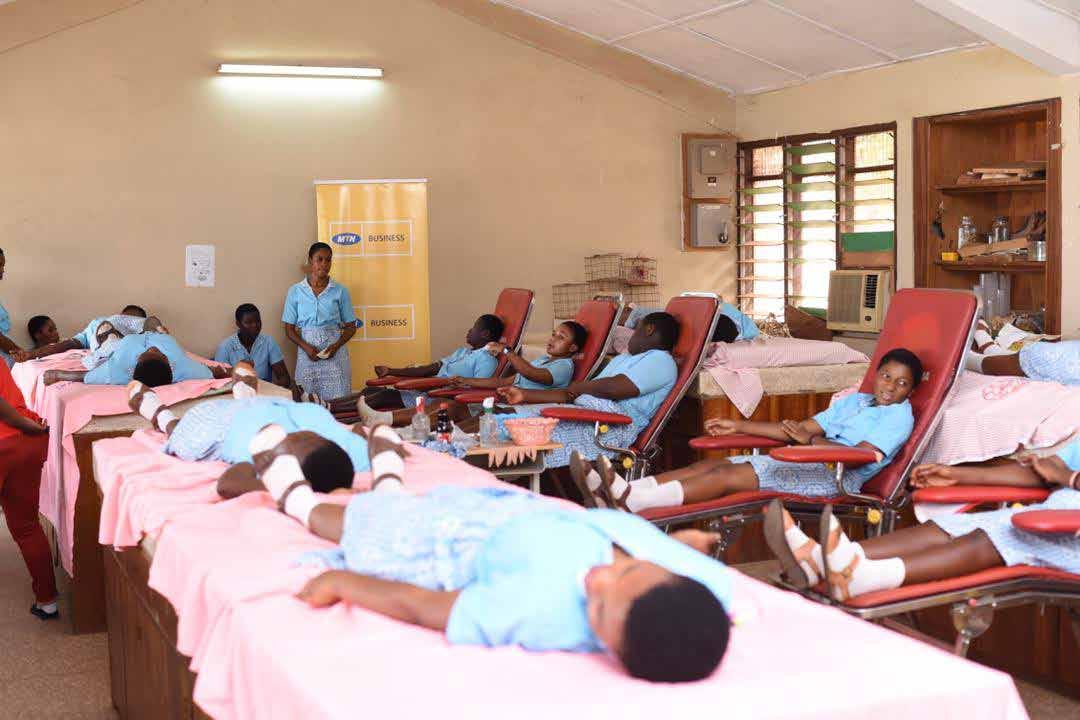
the only means to support friends and loved ones who need blood transfusion to manage health conditions”, Dr. Shirley said.
Dr. Owusu- Ofori also used the opportunity to encourage the public and other stakeholders to work collectively to show love and help save lives by participating in voluntary blood donation exercises.
The ‘Save a Life’ Campaign has since its inception yielded over 20,000 units of blood. Until this year’s event, the highest collection was in 2020, when the ‘Save a Life’ Campaign yielded 6,036 units of blood. Over the years, MTN Ghana Foundation has been recognized for the impact and contributions the ‘Save a Life’ campaign has made to Ghana’s health care system.
Dr Emmanuel Ko Mbiah, a Maritime Consultant and Legal Practitioner, has called on the Government to develop Ghana’s coastline into economic ventures to spur growth.
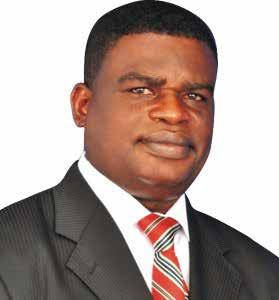
He expressed disgust at the current state of the Greater Accra coastal stretch between Korle Gonno, especially the Korle Lagoon, through to Jamestown, which were prime areas and when developed would be good for tourism.
“This will be worth more than gold, if strategically transformed,” he said.
Dr Mbiah made the call at the Ghana Ports and Harbours Authority (GPHA) forum in Tema, when he spoke on the potential of
the blue economy to sustaining the country’s development.
He stated that government could take a cue from the Clarke Quay area in Singapore, which had been transformed into a holiday spot for tourists.
The Korle Lagoon could be dredged, cleaned, and rehabilitated to serve as alternative transportation for the citizenry and tourists.
Dr Mbiah, a former CEO of the Ghana Shippers Authority, noted that such a transformation would come with the ancillary industries such as boat repair, hospitality, and real estate. Government’s tourism drive could
receive a boost through the strategic transformation of the city’s coastline, he said.
A public-private partnership could be considered for that agenda, he said, and that whilst government provided the environment, the private sector could provide the capital, which it could recoup through the operations. Proper costing could be done for the marine drive, for example, to know its value, and also analyse the synergies for holistic results.
Source: GNA
The International Air Transport Association (IATA) expects a return to pro tability for the global airline industry in 2023 as airlines continue to cut losses stemming from the e ects of the COVID-19 pandemic to their business in 2022.
In 2023, airlines are expected to post a small net pro t of $4.7 billion—a 0.6 per cent net pro t margin.

It is the rst pro t since 2019 when industry net pro ts were $26.4 billion (3.1% net pro t margin).
In 2023, airline net losses are expected to be $6.9 billion (an improvement on the $9.7 billion loss for 2022 in IATA’s June outlook). This is signi cantly better than the losses of $42.0 billion and $137.7 billion that were realised in 2021 and 2020 respectively. Resilience has been the hallmark for airlines in the COVID-19 crisis. This year, the nancial recovery is expected to take shape with a rst industry pro t since 2019.

That is a great achievement, considering the scale of the nancial and economic damage caused by government imposed pandemic restrictions. But a $4.7 billion pro t on industry revenues of $779 billion also illustrates that there is much more ground to cover to put the global industry on a solid nancial footing.
Many airlines are su ciently pro table to attract the capital needed to drive the industry forward as it decarbonises. But many others are struggling for a variety of reasons. These include onerous regulation, high costs, inconsistent government policies, ine cient infrastructure and a value chain where the rewards of connecting the world are not equitably distributed,” IATA’s Director General, Willie Walsh said.
Picture for 2023
Improved prospects for 2023 stem largely from strengthened yields and strong cost control in the face of rising fuel prices.
Passenger yields are expected to grow by 8.4 per cent (up from the 5.6% anticipated in June). Propelled by that strength, passenger revenues are expected to grow to $438 billion (up from $239 billion in 2021).
Air cargo revenues played a key role in cutting losses, with revenues expected to reach $201.4 billion. That is an improvement compared with the June 2022 forecast, largely unchanged from 2021, and more than double the $100.8 billion earned in 2019.
Overall, revenues are expected to grow by 43.6 per cent compared to 2021, reaching an estimated $727 billion.

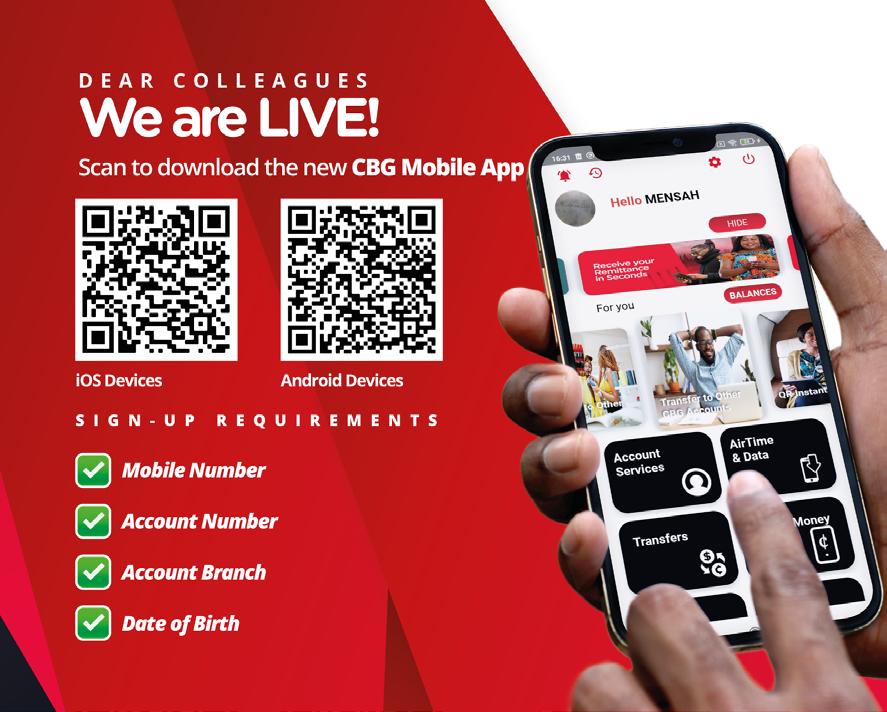
Most other factors evolved in a negative manner following a downgrade of GDP growth expectations (from 3.4% in June to 2.9%), and delays in removing COVID-19 restrictions in several markets, particularly China. IATA’s June forecast anticipated that passenger tra c would reach 82.4per cent of pre-crisis levels in 2022, but it now
appears that the industry demand recovery will reach 70.6 per cent of pre-crisis levels. Cargo, on the other hand, was anticipated to exceed 2019 levels by 11.7 per cent , but that is now more likely to be moderated to 98.4 per cent of 2019 levels.
On the cost side, jet kerosene prices are expected to average $138.8/barrel for the year, considerably higher than the $125.5/barrel expected in June. That re ects higher oil prices exaggerated by a jet crack spread that is well-above historic averages. Even with lower demand leading to reduced consumption, this raised the industry’s fuel bill to $222 billion (well above the $192 billion anticipated in June).
That airlines were able to cut their losses in 2022, in the face of rising costs, labour shortages, strikes, operational disruptions in many key hubs, and growing economic uncertainty speaks volumes about peoples’ desire and need for

India is poised to become the world’s most important country in the medium term. It has the largest population (which is still growing), and with a per capita GDP that is just one-quarter that of China’s, its economy has enormous scope for productivity gains.
Moreover, India’s military and geopolitical importance will only grow, and it is a vibrant democracy whose cultural diversity will generate soft power to rival the United States and the United Kingdom.
One must credit Indian Prime Minister Narendra Modi for implementing policies that have modernized India and supported its growth. Speci cally, Modi has made massive investments in the single market (including through de-monetization and a major tax reform) and infrastructure (not just roads, electricity, education, and sanitation, but also digital capacity). These investments – together with industrial policies to accelerate manufacturing, a comparative advantage in tech and IT, and a customized digital-based welfare system – have led to robust economic performance following the COVID-19 slump. Yet the model that has driven India’s growth now threatens to constrain it. The main risks to India’s development prospects are more micro and structural than macro or cyclical. First, India has moved to an economic model where a few “national champions” – e ectively large private oligopolistic conglomerates – control signi cant parts of the old economy. This resembles Indonesia under Suharto (1967-98), China under Hu Jintao (2002-12), or South Korea in the 1990s under its dominant chaebols.
In some ways, this concentration of economic power has served India well. Owing to superior nancial management, the economy has grown fast, despite investment rates (as a share of GDP) that were much lower than China’s. The implication is that India’s investments have been much more e cient; indeed, many of India’s conglomerates boast world-class levels of productivity and competitiveness.
But the dark side of this system is that these conglomerates have been able to capture policymaking to bene t themselves. This has had two broad, harmful e ects: it is sti ing innovation and e ectively killing early-stage startups and domestic entrants in key industries; and it is changing the government’s “Make in India” program into a counterproductive, protectionist scheme.
We may now be seeing these e ects re ected in India’s potential growth, which seems to have declined rather than accelerated recently. Just as the Asian Tigers did well in the 1980s and 1990s with a growth model based on gross exports of manufactured goods, India has done the same with exports of tech services. Make in India was intended to strengthen the economy’s tradable side by fostering the production of goods for export, not just for the Indian market.
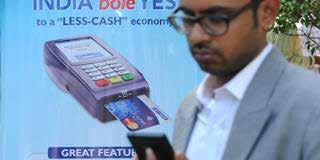
Instead, India is moving toward more protectionist import-substitution and domestic production subsidization (with nationalistic overtones), both of which insulate domestic industries and conglomerates from global competition. Its tari policies are preventing it from becoming more competitive in goods exports, and its resistance to
joining regional trade agreements is hampering its full integration into global value and supply chains. Another problem is that Make in India has evolved to support production in labor-intensive industries such as cars, tractors, locomotives, trains, and so forth. While the labor intensity of production is an important factor in any labor-abundant country, India should be focusing on industries where it has a comparative advantage, such as tech and IT, arti cial intelligence, business services, and ntech. It needs fewer scooters, and more Internet of Things startups. Like many of the other successful Asian economies, policymakers should nurture these dynamic sectors by establishing special economic zones. Absent such changes, Make in India will continue to produce suboptimal results.
Finally, the recent saga surrounding the Adani Group is a symptom of a trend that will eventually hurt India’s growth. It is possible that Adani’s rapid growth was enabled by a system in which the government tends to favor certain large conglomerates and the latter bene t from such closeness while supporting policy goals. Again, Modi’s policies have deservedly made him one of the most popular political leaders at home and in the world today. He and his advisers are not personally corrupt, and their Bharatiya Janata Party will justi ably win re-election in 2024 regardless of this scandal. But the optics of the Adani story are concerning.
There is a perception that the Adani Group may be, in part, helping to support the state political machinery and nance state and local projects that would otherwise go unfunded, given local scal and technocratic constraints.
In this sense, the system may be akin to “pork barrel” politics in the US, where certain local projects get earmarked in a legal (if not entirely transparent) congressional vote-buying process. Supposing that this interpretation is even partly correct, Indian authorities might reply that the system is “necessary” to accelerate infrastructure spending and economic development. Even so, this practice would be toxic, and it would represent a wholly di erent avor of realpolitik compared to, say, India’s vast purchases of Russian oil since the start of the Ukraine War. While those shipments still account for less than one-third of India’s total energy purchases, they have come at a signi cant discount. Given per capita GDP of around $2,500, it is understandable that India would avail itself of lower-cost energy. Complaints by Western countries that are 20 times richer are simply not credible.
While the scandal surrounding the Adani empire does not seem to extend beyond the conglomerate itself, the case does have macro implications for India’s institutional robustness and global investors’ perceptions of India. The Asian nancial crisis of the 1990s demonstrated that, over time, the partial capture of economic policy by crony capitalist conglomerates will hurt productivity growth by hampering competition, inhibiting Schumpeterian “creative destruction,” and increasing inequality.
It is thus in Modi’s long-term interest to ensure that India does not go down this path. India’s long-term success ultimately depends on whether it can foster and sustain a growth model that is competitive, dynamic, sustainable, inclusive, and fair.
The 2021 edition which held online had speakers such as Dr Brian Reuben, Founder, Brian Reuben Organization (UK); Dr Benjamin Dike, Founder, Joshua Leadership Project (Nigeria); Tunde Success, Founder, Eudoracity Business School (Nigeria); Benjamin Ko Quansah (Ghana) impacted thousands of business people around Africa.
According to Godswill O. Erondu, the pioneer of the Conference, in response to the importance of this special edition said, "So far, in 2023, about 98,100 employees have been laid o by tech rms including Microsoft, Google, Amazon, IBM etc. This is a result of the economic downturn that has hit hard

recession, it is important to understand that the challenges in our day presents with them enormous opportunities that anyone could take advantage of.
layo s.'
"As of January 10, 2023 in Ghana Over 3000 construction sector workers were laid o due to IMF deal. The list continues in Nigeria and other countries.
"With the uncertainties in our world today" he continued, "created by event such as war in Ukraine, changes in government and government policies, innovations in AI, climate issues and many more. Many countries will experience shortage in supply of certain resources they require to forge ahead, more companies will downsize, many countries are already in
"That said," he continued, "there can never be any better time for anyone to set up his/her business than now. You don't have to wait to be laid o or su er some kind of mishap before you do that. However, to do that you must realize that the skill set required to be e ective as an employee is di erent from that required to run your own business. There is a need to learn and equip yourself with the necessary skills."
Wisdom For Business Conference presents a chance for people to glean wisdom that empowers them to e ectively use business as a tool for changing the world.
This edition that will hold in March 24th - 25th, 2023 and virtually is focused on employees who want to transition to setting-up or building businesses/companies.
The di erent session will cover topics ranging from crafting a competitive advantage to raising funds for your business, innovative and sustainable enterprise, strategic alliance and much more.
With speakers such Dr Brian Reuben, UK; Fong Chua, Canada; Spencer Korankye, Lead Consultant, Mpact Lane Consult, Ghana; Tunde Success, Founder, Eudoracity Business School, Nigeria; Frida Owinga, Founder, Passion Pro t, Kenya etc participants will receive ideas that will be inspired, equipped and empowered them to set-up and build businesses that will make a di erence in our world.
Newmont Golden Ridge Ltd (Akyem Mine) has presented a cheque for GH¢184.6 million to the Government of Ghana, as dividend for the year 2022.
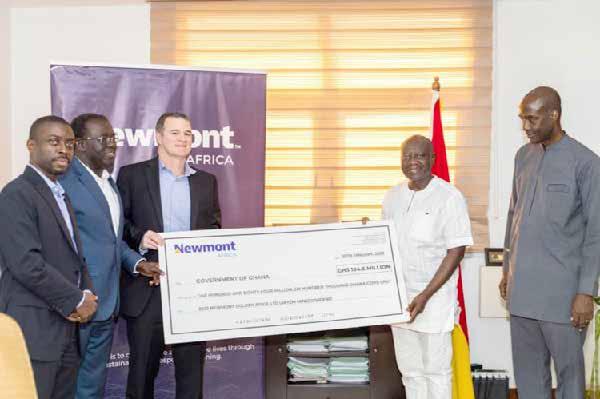
The amount represents the government’s carried interest in the operations of the Akyem mine.
The cheque presentation was made by executives of Newmont Africa, led by the Regional Senior Vice-PresidentAfrica Operations, David Thornton. Mr Thornton thanked the government for its continuous support to Newmont Africa’s Ahafo and Akyem mines and reiterated the company’s commitment to responsible mining operations, while looking to expand Newmont Africa’s footprint in the country with the Ahafo North project.
“Our Ahafo North project remains a key strategic growth prospect for Newmont Africa, and its successful construction and subsequent operation will have immense bene ts to our host communities, the local economy, as well as the broader economy of Ghana, in terms of employment creation, local supply chain opportunities, as well as taxes, royalties, and dividend payments to government,”
Mr Thornton said.
On Newmont Africa’s direct support to the Ghanaian economy in the past year, beyond statutory payments, Mr Thornton mentioned the company’s support for the government’s gold buying programme that was meant to shore up the country’s gold reserves and help stabilise the economy.
In spite of global economic challenges that had negatively impacted businesses globally, Newmont Africa was the rst mining company to support the government’s gold buying programme by selling 3,500 ounces of gold to the government, through the Bank of Ghana (BoG) in May 2022.”
“An additional 22,500 ounces of gold was sold to BoG in October and November 2022, making a total of 26,000 ounces of gold sold to govern ment in 2022,” he added.
Newmont commended
Receiving the cheque, the Minister of Finance, Ken Ofori-Atta, commended Newmont Africa for its compliance to tax and other nancial payments to the government of Ghana.
The minister also lauded Newmont Africa for its prompt payment of taxes and acknowledged the potential bene ts of the Ahafo North project.
He said, “We welcome payments such as these, especially during these challenging times, and we wish to commend you for being prompt with your payments, be they taxes, royalties, or dividends.”
“We are aware that the Ghana Revenue Authority has recognised you, on several occasions, for your tax compliance.
We look forward to the resumption of your Ahafo North project this year, which will bring in even more revenue to the state.”
Through a combination of tax payments in United States dollars, as well as making forex available to the BoG, Newmont Africa has supported and impacted forex availability to the government of Ghana.
Chief Executive O cer of MIKADDO
Holdings Nana Dr. Michael Agyekum
Addo is hosting the “Marketing with In uencers” conference that is set to take place on Saturday March 18, 2023 at 9 am at the Mikaddo Plaza, Labone. This is a free event and is open to all who have an interest in the subject matter.
The aim is to train entrepreneurs and educate businesses and start-ups on exploring clear road maps to navigate the market. Undoubtedly, entrepreneurship is a formidable shield we can always rely upon.
It is an anchor which when depended on will help re-write the story of unemployment in our country. It is the delight of great leaders to equip young individuals with the requisite skills to maximize the opportunities they are presented with. This summit encapsulates this and practical ways to thrive in a competitive and contemporary market.
The focus of this summit is “Marketing with In uencers” and will explore the many creative ways small businesses, upcoming entrepreneurs, individuals and SMEs can tap into the world of digital marketing and partnerships with in uencers to maximize sales and create brand awareness.
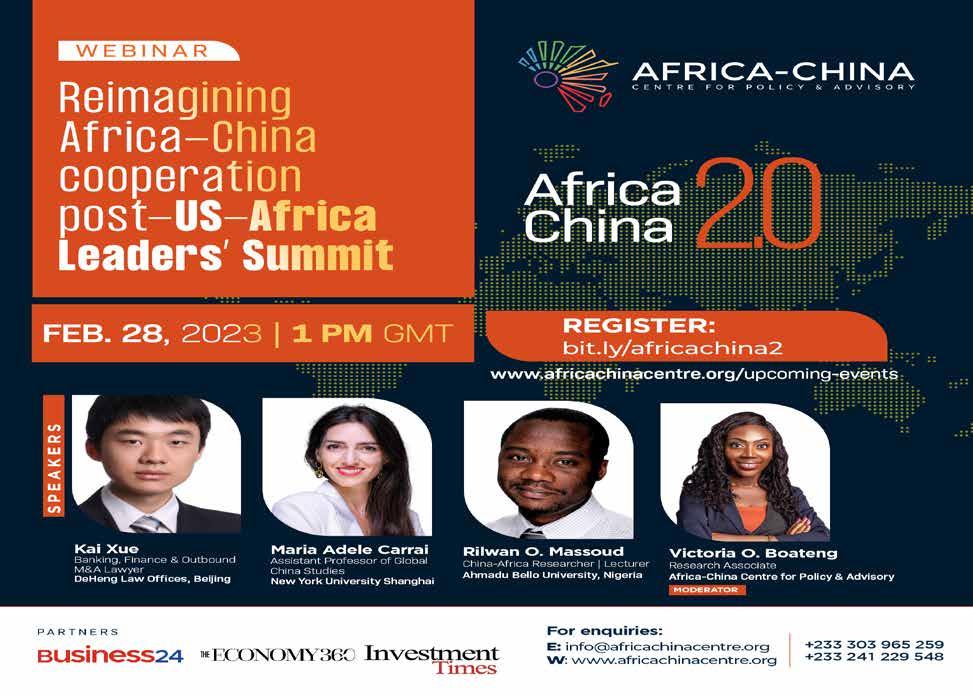
The thematic areas are highlighted below; “Entrepreneurship”- Entrepreneurship is not a small feat. The journey requires a lot of skill, perseverance and continuous learning and unlearning. The program will throw more light on
industry secrets that have worked for some entrepreneurs and will bring to bear many practical examples from local perspectives that will allow participants to easily relate to.
“Branding”- Every organization needs a unique identi cation which can be noted by target customers and market.
This can and has become a relevant topic for discussion by a lot of people both in the corporate and outside the corporate space. Creating an indelible mark in the minds of your customers can be achieved when branding is executed with nesse.
“Sales”- Sales can double or even triple depending on a number of factors. One of which includes its selling strategies. In modern times, many organizations employ various methods to reach their targets. In uencers are setting the pace in business as they have established themselves as having the capability to pull and interact with prospective clients through various engaging ways.
“Digital Marketing”- For every growing organization, digital channels essentially help to promote goods and services. As an entrepreneur you must adopt the use of digital channels such as websites, mobile devices, social media, search engines, and other similar channels. This event will make it easy for you to use these tools to connect with your existing and prospective buyers.
Pro le of speakers
Speaking at this awesome session are great professionals and industry
players
whose nuggets will bring a facelift to the businesses of attendees.
Nana Dr. Michael Agyekum Addo is an accomplished entrepreneur who has built a huge business footprint in the pharmaceutical industry in Ghana. He received his education from the Kwame Nkrumah University of Science and Technology (KNUST) where he earned his Bachelor’s Degree in Pharmacy, and proceeded to study for his Master’s Degree in Industrial Management from the same university.
Dr. Agyekum Addo started his journey operating a pharmaceutical shop in Kumasi in 1983. He has also established the Mikaddo Educational Project, which trains teachers to make entrepreneurs out of students from a young age and has also written a number of books with a goal of instilling the ‘can- do’ attitude in the younger generation. Other speakers are Akosua Agyapong, a Ghanaian female highlife singer and television personality. This legendary name became a household word in the mid-1990s for both her sweet voice and her elaborate dance moves. Akosua has ve albums to her credit, one in collaboration with NAKOREX and another as a member of NAKOREX. She was honoured in August 2019 at an event dubbed “Celebrating Akosua Adjepong 30@50”. This was to celebrate her for having chalked 30 years as an artiste. Samuel Agyeman-Prempeh, a Certi ed Professional Trainer (CPT) by the International Association for People & Performance Development (IAPPD) and
a publishing consultant assisting busy executives to write and publish bestselling books.
He has served as Head of Protocol at a diplomatic mission, Corporate A airs O cer at a French multinational agribusiness and as Events & Media Correspondent for a digital ad agency. Augustus Koranteng Kyei, legally known as Augustus Koranteng Kyei. Kobby Kyei is among the award-winning bloggers in Ghana and has won many awards in Ghana including the National Communications Awards, (Online Media Personality) Youth Excellence Awards, (Best Youth Blogger of The Year), Ghana Tertiary Awards (Tertiary Star Role Model of the Year), Ghana Web Excellence Awards (Best Blogger of the Year).
Mr. Kingsley Kwaku Pinkrah, the Founding President and CEO of Community and Entrepreneurial Development Initiative (CEDI Ghana). He is a multiple award - winning social entrepreneur, social activist, and business advisor. Kingsley holds Master of Business Administration in Finance (Distinction) from Kwame Nkrumah University of Science and Technology.
In an attempt to excel in today’s market, you need to be on top of your game by using up-to-date knowledge to make informed decisions and modern technology to arrive at data-driven solutions. With the avenue for attendees to network, the opportunity for creating new businesses is limitless.
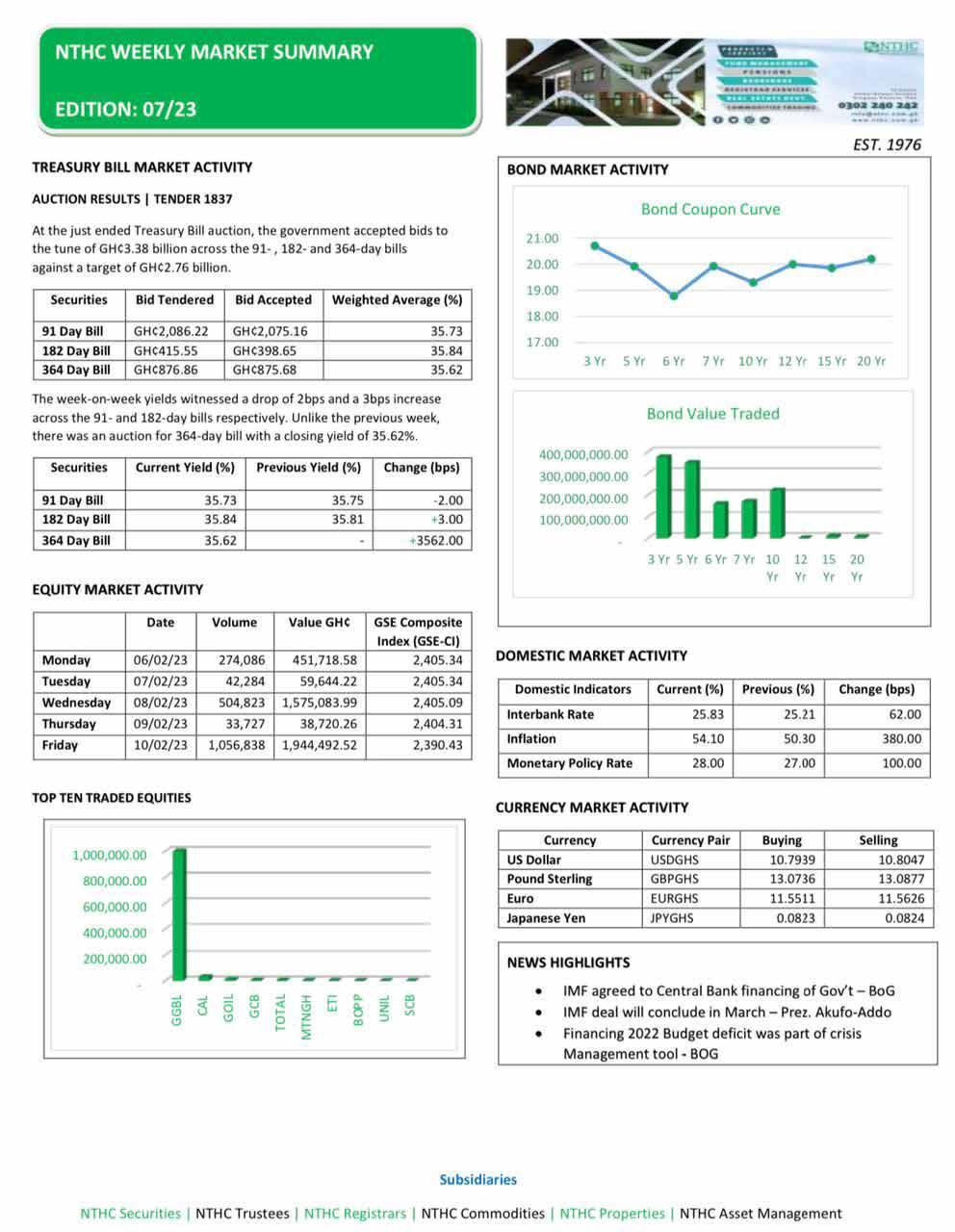
released Africa’s Macro-Economic Performance and Outlook report into their national development plans.
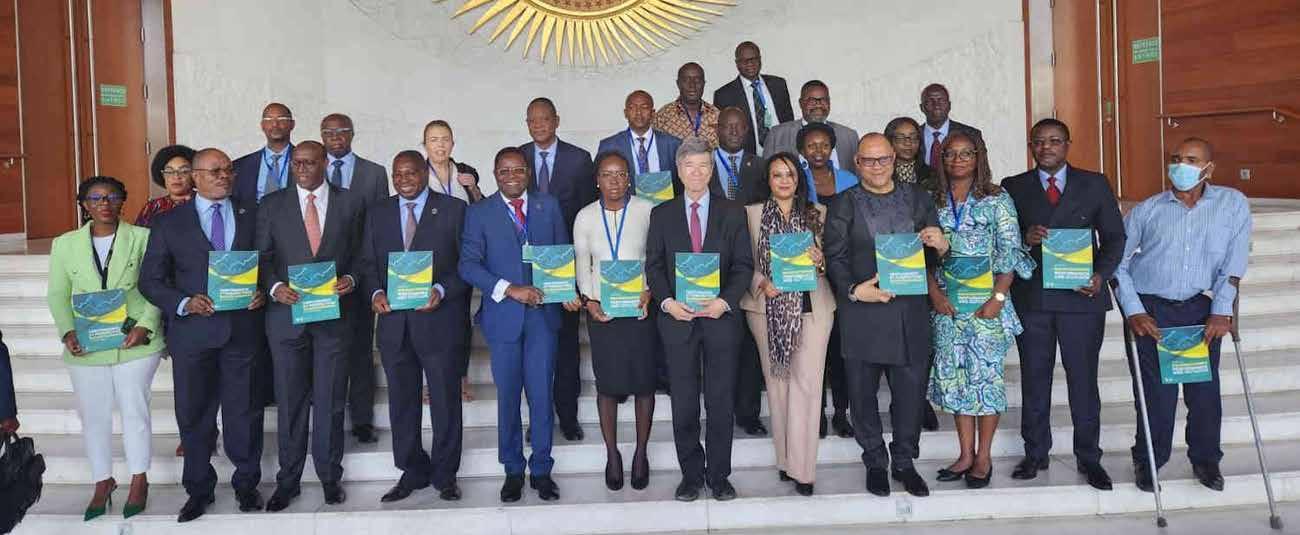
Zambian President Hakainde Hichilema said the study, conducted by the African Development Bank Group, provided an impetus for the continent’s leaders to forge ahead with needed reforms. His remarks were read on his behalf by Zambia’s Minister of Finance and National Planning, Dr. Situmbeko Musokotwane, during an event to present the report at the 36th African Union Summit in Addis Ababa.
The Zambian president described the report as a signi cant milestone in the quest for evidence-based knowledge to inform policymaking for a more prosperous and sustainable future for Africa.
“The ndings of this important report, therefore, provide us with a set of concrete policies that we must urgently implement to sustain the recovery and build resilience in Zambia, and on the continent more generally,” President Hichilema stressed. He observed that although Zambia was not spared from global shocks, the country’s economy has shown resilience.
He also acknowledged the impact of Zambia’s heavy debt burden on the country’s scal stability and said his administration had launched reforms that would spur economic growth to 4.0 percent in 2023 and 4.3 percent in 2024.
The African Development Bank Group released the inaugural Africa's Macroeconomic Performance and Outlook report on January 19. It has since attracted signi cant interest among decision-makers in Africa and globally. The biannual report o ers policymakers, global investors, researchers, and other development partners, up-to-date,
short-to-medium-term outlook.
In his opening remarks, African Union Commission Chairperson Moussa Faki Mahamat told participants that the report would be presented to heads of state at the African Union Summit to help steer national planning.
“Knowledge is power. The report, to be published twice a year, is a wealth of knowledge - with deep insight into what is going on in Africa in the macroeconomic sphere. It identi es challenges and opportunities for the good of our continent,” he said. “If governments, the private sector, and other stakeholders adopt the report, they will be better placed to make informed decisions.”
The report calls for timely structural reforms to enhance government-enabled private-sector industrialization in key areas.
Nigeria's Minister of Finance, Budget, and National Planning Zainab Ahmed said: “All the issues raised in the report a ect our country as well. We have steered the country towards pre Covid-19 era, but we still face some challenges.”
Ahmed said: “We have been asking for a liquidity facility as part of the SDRs (Special Drawing Rights) to act as a cushion for us. We have also asked multilateral development banks to give us longer-term nancing. Nigeria has shown a lot of resilience. We just need that support to enable us to take the full potential.”
African Development Bank President
Akinwumi Adesina observed that although African economies have shown impressive resilience, global support is needed to help the continent navigate nancial burdens and its security challenges.
“Despite the slowdown occasioned by
2022 with stable outlook in 2023 and 2024. African economies are indeed resilient,” Adesina said.
He called for strong and collective support to Africa to help the continent navigate the challenges it faces, especially debt burden and debt vulnerabilities.
The bank president explained further: “Africa cannot run up the steep hill carrying a bag of debt on its back. The channeling of the additional $100 billion of Special Drawing Rights will make a huge di erence. We must join hands to harness the enormous opportunities in Africa. There is no doubt that we will make good progress. However, we must work fast, be inclusive, and be competitive.”
Also speaking, Assistant Minister of Finance for Policies and Economic A airs of Egypt, Dr. Mohammed Ibrahim, said the report is helpful for African policymakers and researchers as a timely databank of sound and evidence-based projects for development and planning.
In a presentation, the Director of the Center for Sustainable Development, Columbia University, Prof. Je rey Sachs, said that Africa had the capacity to achieve 7- 10 % yearly growth.
He observed that Africa could take advantage of its population to grow a robust single market, citing examples like China and India.
"Building a single market will enable Africa to position itself among the three largest global marketplaces. The continent has the greatest growth potential,” he said, challenging African leaders to build vital regional infrastructure and close the infrastructure gaps over the following decades.”
He urged governments to lead a revolution to bring about a ordable access to health care and education. Sachs called for greater nancing for the continent to
cial needs.
“The African Union needs to become a permanent member of the G-21,” he added.
Acting Chief Economist and Vice President of the African Development Bank, Prof Kevin Urama, highlighted the importance of Africa’s Macroeconomic Performance and Outlook 2023.
He said: “As we gather here today, global macroeconomic conditions have become increasingly uncertain due to multiple overlapping shocks that make policymaking and investment decisions very challenging. Countries need regular diagnostics and focused policy actions to address these recurring and overlapping shocks.”
Professor Urama a rmed that Africa remains the place to invest despite su ering global shocks.
What the 2023 Africa’s Macro-Economic Performance and Outlook report says Following two years of global shocks, the report notes that African economies are set to overcome various domestic and global shocks and return to a path of economic recovery, stability, and growth.
The lingering e ects of the Covid-19 pandemic, the ravages of accelerating climate change, and the impact of rising geopolitical con icts and tension slowed Africa’s growth to an average of 3.8% in 2022.
To sustain growth, Africa’s economies will require comprehensive information and insights to navigate a labyrinth of intertwined global risks, the report stated. The bank will release the report in the rst and third quarters of each year to complement its agship Annual African Economic Outlook. The African Development Bank is the rst institution to release a macroeconomic outlook for Africa for 2023.
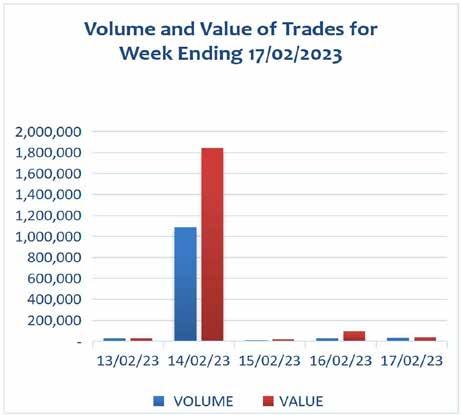
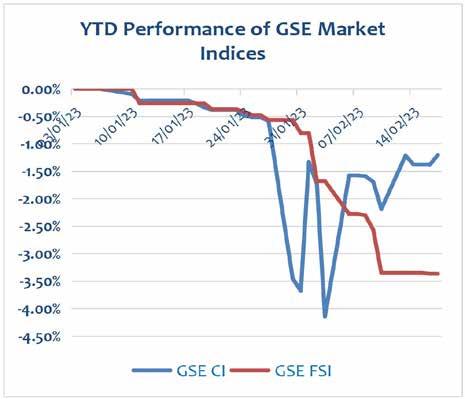
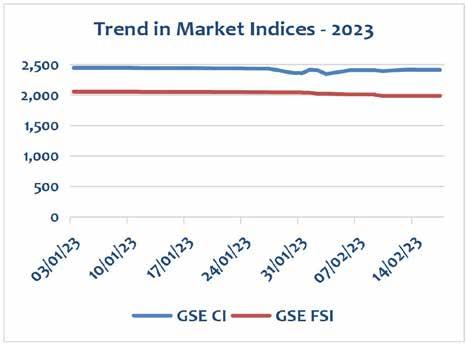


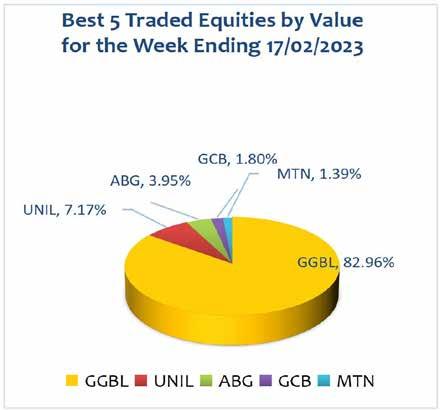
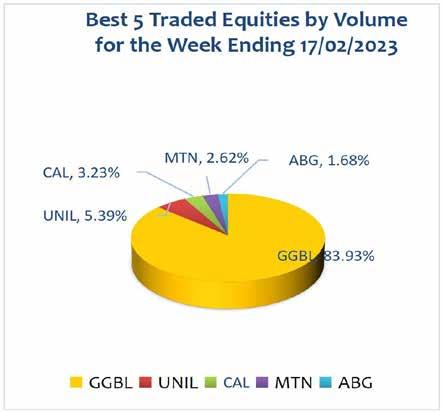
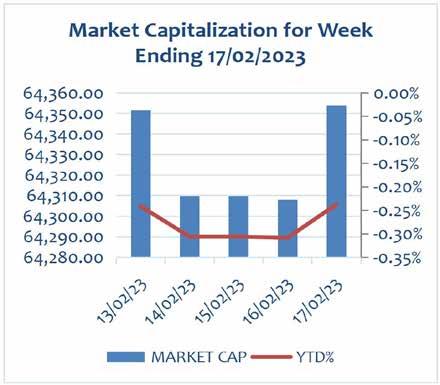

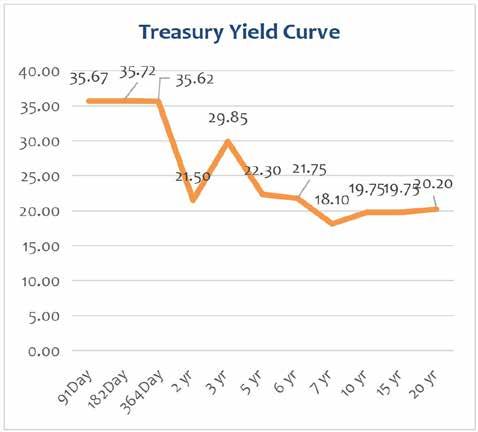

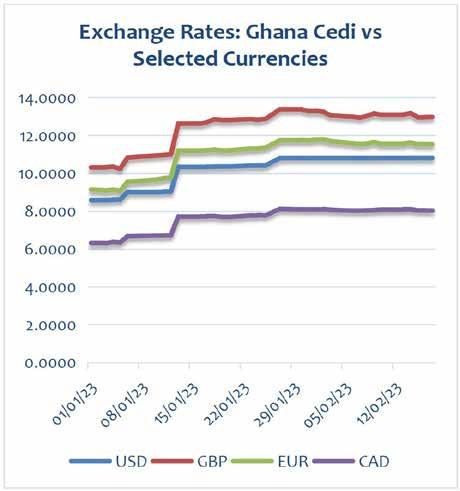


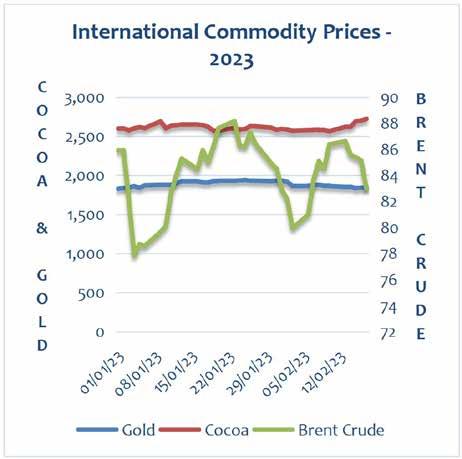


The year is 2025. A woman with diabetes living in a rural area, where there is a shortage of health-care workers, must manage her condition. To whom or what does she turn? Her smartphone. In just two years, the delivery of health care – and many other services – could look very di erent than it does today. During the three years I served as the chairperson of Ehsaas, Pakistan’s largest social safety and poverty allevi-
ation program, I observed the infrastructure required to facilitate digital payments. Gateways and switches form the backbone of these systems, but so do policies, standards, and regulatory frameworks. Ehsaas itself is currently in the process of developing a one-of-a-kind digital ecosystem that could serve millions of families. It includes the Ehsaas Saving Wallets initiative, implemented under
the “One Woman, One Bank Account” policy, and allows bene ciaries of the Ehsaas Kafaalat program, which gives monthly cash stipends to the country’s poorest women, to withdraw or save their money. The new ecosystem also includes the Ehsaas Rashan Riayat program, a technology-led e ort to disburse subsidies. Using the Rashan app, eligible families receive discounts on select food items at registered kiryanas, or small general stores. When coupled with the right scal incentives, these initiatives could increase nancial inclusion and accelerate the transition from cash to digital payments.
Even in the remotest parts of the world, fast-food chains and taxi companies harness the power of mobile technologies to deliver goods and services.
Theoretically, the same technological capabilities could form the basis of innovative public-sector digital ecosystems that are transparent, accountable, and responsive. The Ehsaas ecosystem represents one step in the right direc-
tion.
An end-to-end digital primary health-care system could mitigate or even surmount systemic problems such as absenteeism, hemorrhaging supply chains, institutionalized theft, low quality of care and responsiveness, rent-seeking behavior, informal payments, and structural ineciencies. The use of blockchain alone – a multipurpose technology – can safeguard security, increase transparency, and potentially prevent fraud and minimize losses in health systems.
COVID-19, the in ation crisis, and the climate catastrophe have underscored the need to reshape public institutions and health-care delivery. Investing heavily in digitalization, modernizing payment systems, and formulating policy and regulatory frameworks are all crucial to realizing a future where a woman with diabetes can treat her condition using a constellation of medical technologies. The technology already exists. The task now is to harness it for all.s debt restructuring.
EDITOR: BENSON AFFUL editor@business24 com gh | +233 5 45 516 133 PUBLISHED BY BUSINESS24 LTD
PUBLISHED BY BUSINESS24 LTD
